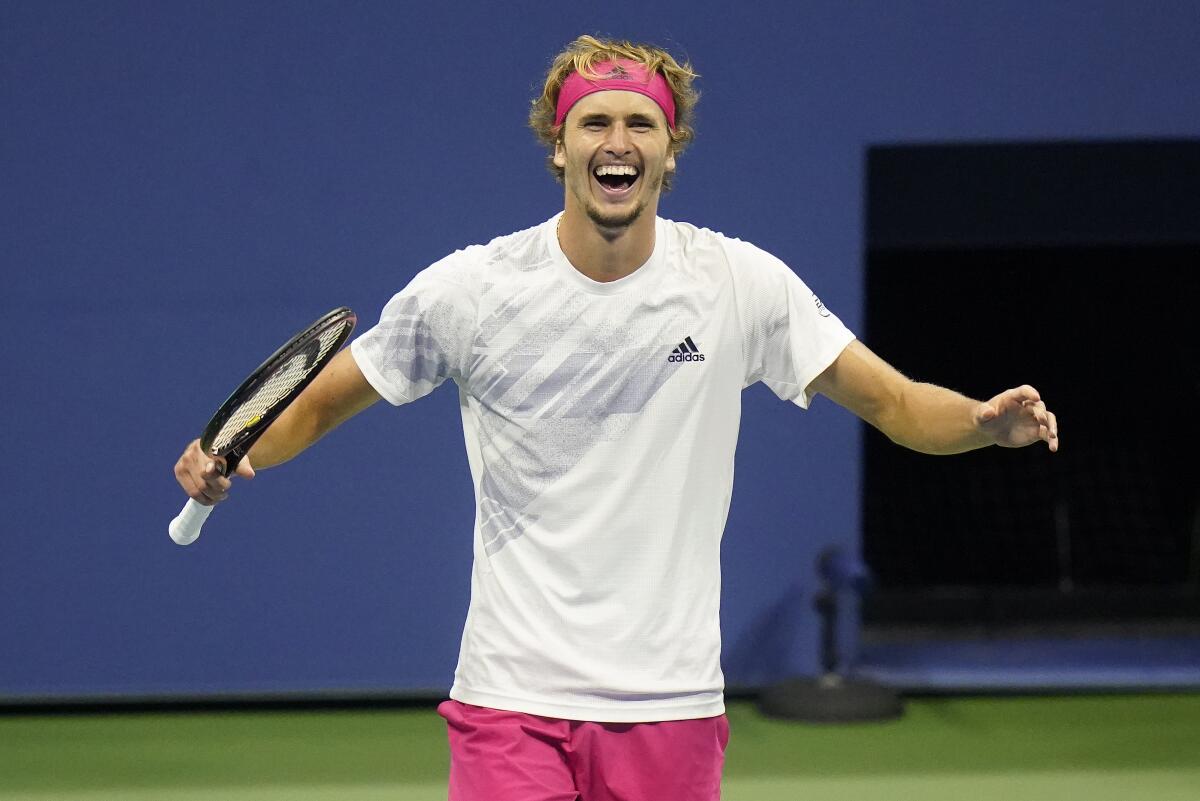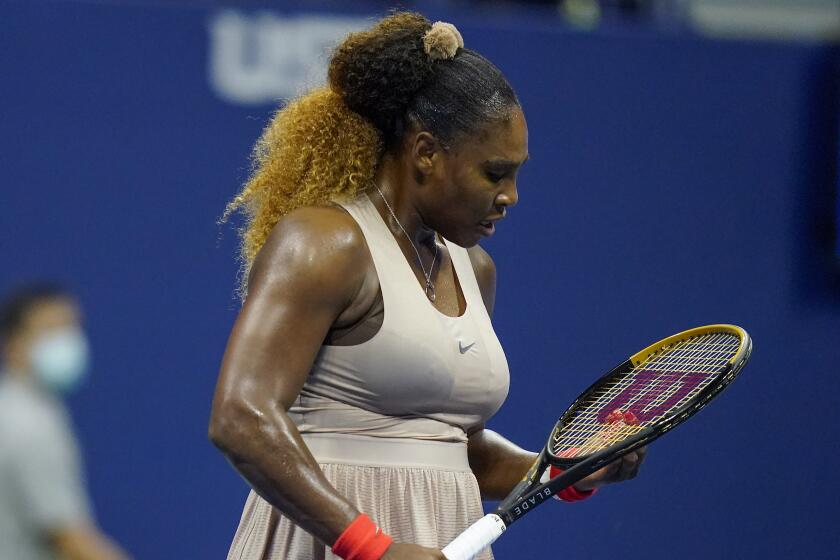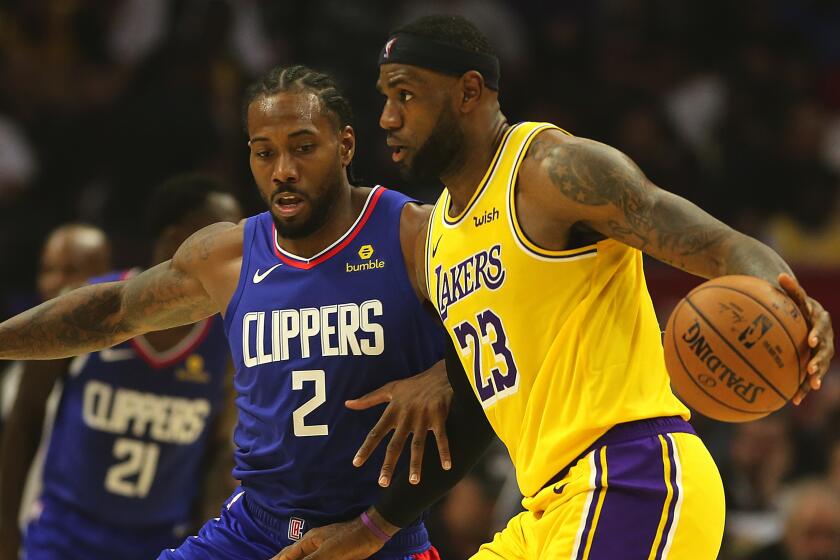Alexander Zverev rallies to reach U.S. Open final, will face Dominic Thiem

- Share via
NEW YORK — For two full sets, Alexander Zverev was confused and listless, his body language as poor as his winner-to-error ratio against Pablo Carreno Busta in the U.S. Open semifinals Friday.
Zverev double-faulted and smacked his left high. He put a backhand into the net to cede the opening set and covered his face with both hands. He netted a forehand early in the next set — part of a stretch in which he dropped nine points in a row and 17 of 19 — turned a forlorn face toward his guest box and put his palms up.
When he pushed a backhand long after 1 hour 25 minutes of play and shook his head, Zverev trailed by two sets, a deficit the 23-year-old German never had overcome. Never had been to a Grand Slam final either. Done and done. Zverev constructed quite a comeback, getting his game in gear to beat a fading Carreno Busta 3-6, 2-6, 6-3, 6-4, 6-3 and reach the title match at Flushing Meadows.
“I was like, ‘I can’t believe it. I’m playing in the semifinal, where I’m supposed to be the favorite, and I’m down two sets to love and I have no chance. I’m playing that bad,’ ” Zverev said. “So I knew I had to come up with better tennis, and I knew that I had to be more stable.”
Zverev is the first man to win a U.S. Open semifinal after a 2-0 set deficit since Novak Djokovic did it against Roger Federer in 2011 — and, keeping good company, he’s also the youngest male finalist at any major tournament since Djokovic was 23 in New York in 2010.
Zverev, the No. 5 seed, will play No. 2 Dominic Thiem, who advanced to his first U.S. Open final by beating No. 3 Daniil Medvedev 6-2, 7-6 (7), 7-6 (5). The winner of Sunday’s final will earn his first Grand Slam title.
After dominating the first set, Serena Williams falls to Victoria Azarenka in the U.S. Open semifinals. Azarenka will play Naomi Osaka for the title.
Thiem has had three previous chances, losing back-to-back French Opens to Rafael Nadal in 2018 and 2019 and this year’s Australian Open to top-ranked Novak Djokovic.
He got another opportunity by overcoming a 5-2 deficit in the third set after he had been treated for a right Achilles tendon injury after the second set.
Medvedev, the runner-up to Nadal last year in Flushing Meadows, hadn’t dropped a set coming into the semifinals.
It had been 16 years since Grand Slam semifinals were held without at least one of Federer, Djokovic or Rafael Nadal involved.
Nadal chose not to try to defend his title in New York because of the COVID-19 pandemic; Federer is out for the rest of 2020 after two knee operations; Djokovic’s tournament ended at 6-5 in the first set of his fourth-round match against Carreno Busta when the No. 1 seed and title favorite unintentionally hit a line judge in the throat with a ball after getting broken.
Zverev has been considered likely to grab one, given his success at other events and all of the talent in his 6-foot-6 (1.98-meter) frame.
His first trip to a major semifinal came in January at the Australian Open, where he was eliminated by Thiem.
Now he’s gone a step further. Didn’t look like he would in the early going Friday in a mostly silent and empty Arthur Ashe Stadium, where spectators are barred because of the pandemic.
A day after a pair of well-played and competitive women’s semifinals — won by Naomi Osaka and Victoria Azarenka, who face each other Saturday for the championship — Carreno Busta vs. Zverev offered little in the way of those characteristics for two sets.
That was primarily Zverev’s fault. He was tentative, unsure of himself, willing to stay back and leisurely exchange groundstrokes from the back of the court.
With the Lakers and Clippers each a win away from squaring off in the NBA playoffs, it’s time to embrace the impending showdown between the peaking rivals.
It was an inadvisable strategy against a human wall like the 20th-seeded Carreno Busta, who might not do much spectacularly but certainly does everything solidly.
It’s not as if Carreno Busta was impeccable. Yes, his forehand was working well and he wasn’t making many mistakes. But one indication of his own uneven play: Carreno Busta was broken the first time he served for the opening set, and again the first time he served for the next.
But Zverev simply kept missing the mark, even on neutral balls. Half of Carreno Busta’s first 72 points came via unforced errors off Zverev’s racket. Eventually, though, things got more interesting, both because Zverev became a bit more aggressive and because he finally calibrated his shots correctly.
“I had to be more aggressive generally, I think,” Zverev said, “and it turned out well for me.”
After averaging 18 unforced errors over those first two sets, he averaged seven per set over the last three.
And he rode his booming serve to 24 aces.
Three breaks in a row — two by Zverev — swung the third set his way, and when he broke again to go up 2-1 in the fourth, he shook his right fist as he walked to the sideline.
Before the start of the fifth set, Carreno Busta took a medical timeout and got his back worked on by a strainer, something he did at the same stage of his marathon quarterfinal victory over Denis Shapovalov.
This time, it was Zverev’s surge that continued, undeterred when Carreno Busta twice hit balls right at him during points in the fourth set.
When it ended with one last break of serve, Zverev finally could allow himself a wide smile.
More to Read
Go beyond the scoreboard
Get the latest on L.A.'s teams in the daily Sports Report newsletter.
You may occasionally receive promotional content from the Los Angeles Times.












